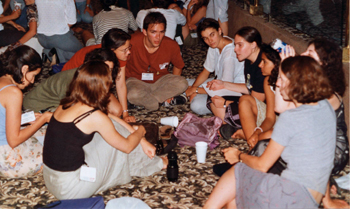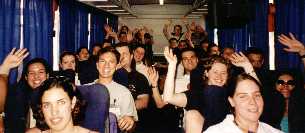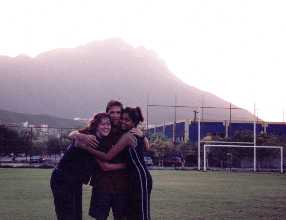

IFMSA General Assembly - Monterrey, Mexico
6-12 August 1999
Report by Chris Hopkins, Treasurer, MedSIN-RUMS
There were three of us from MedSIN-RUMS who were lucky enough to go to this massive IFMSA conference in Monterrey, Mexico in August. Along with nine other MedSINners from the rest of the UK, we had a fairly large and enthusiastic delegation!
|
MedSIN-RUMS: Victoria Wykes, Chris Hopkins, Anita Sugavanam |
|
The IFMSA and its meetings
The International Federation of Medical Students' Associations is an organisation founded in 1951 by medical students from several different countries. Its aim then, and now, was to facilitate the encouragement of awareness among medical students of global health issues by providing a forum where medical students in different countries could share ideas, enthusiasm, experience and knowledge of medicine in their own parts of the world.
Now the IFMSA has grown massively to incorporate groups in over 60 different countries, encompassing an estimated 800,000 medical students. It is officially recognised by the UN and WHO as a non-governmental, non-political and non-religious organisation, and is seen as an important representation of medical students and the medical profession.
The IFMSA divides its activities into six 'Standing Committees'. SCORP deals with Refugees & Peace, SCOPH with Public Health, SCORA with Reproductive health and AIDS, SCOME with Medical Education, SCOPE with Professional Exchanges and SCORE with Research Exchanges. The concentration of resources into separate Standing Committees allows the IFMSA to run efficiently, and to achieve a great deal in each of the areas.
Every year there are two important events on the IFMSA calendar. These are the General Assembly (GA) and the Exchange Officers Meeting. The GA is held in August of every year, and is the most important meeting of the IFMSA. In 1999 the GA took place in Monterrey in Mexico from the 6th to the 12th August.
Schedule
The schedule is made up of several different activities. These are generally made up of plenary sessions, Working Committees, special workshops and the social programme.
PLENARY SESSIONS:- The most important parts of the GA are the plenary sessions. These are where elections for new Executive Board (EB) members takes place, and other important matters are also dealt with such as voting in new members, changes to the IFMSA constitution, reports from last year's Executive Board etc. Each National Member Organisation (NMO) is able to vote on such issues in the plenary sessions.
The sessions took place every day but one, although there were two on the last full day. They took place in a conference hall across the road from the hotel where the GA was taking place. Attendance varied, but the room was full for the major sessions, which were the ones where reports from old EB members were heard and voting for the new EB and the venue for next year's GA took place.
The plenary sessions are led by a table, which is voted in right at the beginning of the GA. They lead the sessions by adhering to the agenda, proposing motions, asking for seconders etc. The IFMSA has a well established constitution, which contains a comprehensive protocol for plenary sessions. Many of the issues are dealt with by the passing of a motion, which must be proposed by one NMO and seconded by another, with no direct negatives or amendments. Most pass or fail in this way, but some must go to a vote, where each NMO has one vote.
Probably the best thing to happen in MedSIN since our birth in 1997 was being voted in as full members of the IFMSA in the plenary sessions in Monterrey. We all let out a huge cheer when the motion to allow MedSIN to represent the UK NMO was passed "Nemo Contra"! This was the culmination of many years of hard work by a small group of people, which led to the formation of MedSIN.

WORKING COMMITTEES:- These are the main activities other than the plenary sessions. There is one for each of the IFMSA Standing Committees, and they all meet every day during the GA. All GA participants tend to choose one Working Committee which they attend throughout the GA. The sessions are a forum where issues are discussed, activities presented and ideas proposed. By the end of the GA it is hoped that concrete plans will have been produced for new directions or solid consolidations. The GA is an important time for each of the Standing Committees, as many important matters arise.
SPECIAL WORKSHOPS:- At EOMs and GAs there are usually several workshops on a variety of subjects. These are an opportunity to focus in detail on a specific subject or project, and many workshops will lead to new projects being taken on or assist in the organisation of them.
In Monterrey there were two workshops. One was made up of two sessions, and was about attitudes towards violence. This involved taking a survey, and following this with a discussion. What this reveals is a psychological event called moral disengagement, which tends to cause us to be more willing to accept violence by justifying it in some way. Often this is by euphemistic labelling and use of language, but also by lack of confidence in non-violent solutions. This was in fact an international project, and has now been taken on in the UK as a result of some of us attending the workshop in Mexico. Anita and I are co-ordinating this on a national level.
The other workshop was a session on building and sustaining successful IFMSA programs. This focused very much on teamwork and delegation skills, as well as some time management and organisational theory.
SOCIAL PROGRAMME:- Aside from all the business of these meetings, it is important to have fun and make friends with new people. This is helped along by an often hectic social programme! These social events are often centred around local traditions, although they inevitably end up being a chance for excess alcohol consumption, dancing, making friends and just generally having a great time!

Being in Mexico, it was difficult to stay away from Tequila for too long! In fact, it was the first night! Other events included a rodeo (Monterrey is very close to the Texan border), a lunchtime visit to the local brewery, a Mexican night at a local villa and dinner at the local museum/restaurant. Finally, on the last night there was the traditional "National Drinks Party and Talent Show"! This tends to happen at every meeting, and is a chance for each country to show off the drink which fuels their nation! Our Pimms and Gin & Tonic went down very well! The talent show is an opportunity for each country to make a fool of themselves, and in that MedSIN succeeded!
Apart from the actual organised activities there were often meetings organised as a result of specific matters which had arisen during the conference. Most countries had national meetings almost every day to discuss what had been going on in the Working Committees and plenary sessions. As well as these, lots of small projects and ideas were being discussed whenever anyone could grab a spare moment, and I am sure many of these privately arranged meetings have resulted in some promising new ideas. Anita, Nika and I were involved in a new project to compile a 'manual' for organising SCORP activities, and this will be gradually put together to be completed by the end of Finland.
Leadership Training Programme (LTP)
This was a separate conference which took place directly after the GA. Vic, Anita and I stayed for the duration, while a few of the UK delegation stayed for two days. The others left at the end of the GA.
The LTP was a very valuable experience. Lasting four days, it covered many important and useful topics. Teamwork, time management, fundraising, communication, strategic planning, meetings, evaluation and conflict resolution were all covered. Training was from peers within the IFMSA who all had experience with these areas from their own experiences in IFMSA. We also had Dr. Robert Zielony (or "Dr. Bob"!) as a welcome guest, to share with us his skills with communication and teamwork.
I have definitely used some of the skills learnt at the LTP, and the overall experience has made me more confident in my own organisational ability. I think that such a program would be of use to any medical student. This was also the general consensus among all the participants, and there are plans to incorporate an LTP into every GA.
What did I get out of the GA?
The amount I got out of the GA was incredible. The main experience for me was meeting so many medical students from so many different countries around the world (there were over 400 people there from over 60 different countries), and hearing about what they are involved in. I have always been a firm believer in trying to experience as much as you can in life, and seeing other perspectives, to enrich your own personality. This can be such a valuable commodity to your own experiences, and to others you meet, work with or become close to in the rest of your life. My attendance at the GA in Mexico has certainly enriched my experience, and has given me a broader perspective on which to base my practise of medicine.
The practical skills I learnt are also of immense value. Working as a team, and communicating with people are such essential skills for doctors, and being at the GA helped to hone these skills. Discussing issues in groups, and working towards formulating objectives and concrete plans was a valuable educational experience gained from the Working Committees, and also actually led to new directions for IFMSA activities.
The other experience I got from the GA was one of inspiration from hearing about the amazing experiences that these people have had, and the amazing activities they are involved in. With the inspiration comes ideas, and an insatiable appetite to get involved with the issues that we in MedSIN find important.
I would recommend doing something like this to anyone, and I definitely hope to continue attending IFMSA activities. The experience gained in meeting so many other medical students, of gaining inspiration, of seeing different parts of the world, and learning and practising important practical skills is extremely valuable to future doctors.

Thankyou
On behalf of Vic, Anita and myself, I would like to thank Professor Souhami, Professor John Foreman and the Convocation Trust for kindly sponsoring us to go to Mexico. Without their support we would not have been able to attend, and we are very grateful to them.
![]()
|
|
||
|
MedSIN-RUMS is a full constitutional society of UCL Union |
This page was last updated on 7/11/99 If you see any errors, please email me |
|
![]()